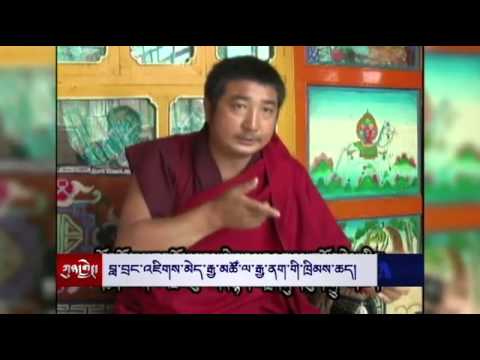
(TibetanReview.net, Mar10’16) – A monk Tibetan political prisoner who had spoken to the Voice of America in 2008 about brutal Chinese torture of Tibetan detainees has been sent to a prison hospital in Lanzhou, capital of China’s Gansu Province, for no known reason, said Dharamshala-based Tibetan Centre for Human Rights and Democracy Mar 8. The centre said the monk, Jigme Gyatso, popularly known as Jigme Guri, of Labrang Monastery in Sangchu (Chinese: Xiahe) County of Kanlho (Gannan) Prefecture, Gansu Province, had sounded his family, who were last allowed to visit him in Jan 25, that prison authorities were talking amongst themselves about putting him in hospital although he did not have any ailment.
The centre cited sources as saying the monk was likely taken to the prison’s Da Xia Ping Prison hospital between the end of February and early march this year. Prison authorities were reported to have informed his family about the hospitalization in a phone call. The family had not been allowed any prison visit after Jan 25.
Before that, the family was allowed one visit each month, but no allowed to bring any homemade food for him. The visits were extremely brief, lasting only about 20 seconds, the centre said.
A relative has been cited as saying Jigme Gyatso should have become entitled to be released on parole in Feb 2016 based on prison labour points he had accumulated. A petition he had submitted in Sep 2014, seeking reduction of his five-year jail sentence, had been turned down.
The monk was first arrested twice in 2008, after which he gave the 20-minute interview to the Voice of America without any concealment of his identity. He spoke about having been kept handcuffed and made to remain in one position for many days and nights, about being suspended from the ceiling and beaten as Chinese interrogators kept telling him to confess, and about being starved and having passed out twice during those interrogations. When he failed to regain consciousness for six days after passing out the second time, and was nearly dead, he was handed over to his family.
He also spoke about prison torture of other monks, including how 180 Tibetan monks, including the most senior lama of a monastery, were arrested and forced to stand on the tips of their toes all night as prison guards beat them with the butts of their rifles. He spoke of the risk he was taking in speaking to the media, pointing out how other monks who had spoken to reporters had their legs broken by being hit with batons, or had been driven insane by use of electric rods on their heads and in their mouths.
Jigme Gyatso was rearrested when he returned to his monastery a month after the interview. He was released six months later, after Chinese human rights lawyers Li Fangping and Jiang Tianyong fought his case. However, he was again arrested in Aug 2011.
This time local authorities prohibited two Beijing rights lawyers, Wang Yajun and Zhang Kai hired by his friends and family, from representing him. The lawyers only learnt that the monk had been charged with “Suspicion of instigating anti-nationalist separatism”. He was tried and sentenced in early 2012, represented against his wish by court-appointed local lawyers.


